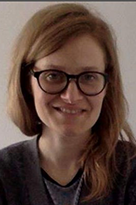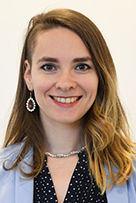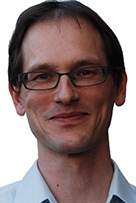Title
Beyond the frontiers of education: How immesive media changes the way we learn
Abstract
Many studies have demonstrated that by embracing technological developments the quality of
education improves, with evidence coming from virtual reality, serious gaming, and intelligent tutoring
systems. In addition, by taking advantage of sensing technologies and learning analytics it becomes possible
to monitor individual and group learning performance online and intervene when a student struggles, thus
providing personalized education. However, immersive media offers an extra advantage, one that can affect
many. Whereas in the past, educational technologies were implemented locally, within a school or school
district, it has become conceivable to put new technological opportunities into effect worldwide. By taking
advantage of cloud computing, 5G networks, and virtual reality headsets (or their proxies), it is now possible
to deliver educational content that is developed anywhere in the world, everywhere in the world. The current
paper describes what it takes to provide high quality education worldwide, given the existing hardware and
software options, and illustrates these opportunities with the SpaceBuzz initiative and the accompanying
educational program.
Keywords
Artificial intelligence, education, intelligent tutoring systems, learning analytics, serious
gaming, virtual reality
Authors
 Max M. Louwerse
Max M. Louwerse
Tilburg University,The Netherlands
Prof. Dr. Max Louwerse is Professor in
Cognitive Psychology and Artificial Intelligence in the Department of Cognitive
Science & Artificial Intelligence at Tilburg University. Louwerse published
over 140 articles in journals, proceedings and books in cognitive science,
computational linguistics, and psycholinguistics and holds two patents. He
served as principal investigator, co-principal investigator, or senior
researcher on over 20 projects totaling €30 million in both the United States
and the Netherlands. In the US he was involved as a Principal Investigator or
Co-Principal Investigator in projects funded by the National Science
Foundation, the National Institutes of Health, and the Institute of Education
Sciences. His research covers a variety of areas, including embodied
conversational agents, intelligent tutoring systems, virtual reality, affective
computing, mental representations, and distributional semantics. Most recently
he has been involved in activities of SpaceBuzz an initiative that aims to create
ambassadors of planet earth by developing innovative technologies for education
using artificial intelligence. He serves on a variety of editorial boards of
academic journals and advisory boards. Louwerse is founder of the DAF
Technology Lab (www.tilburguniversity.edu/dtl),
the virtual and mixed reality lab on the Tilburg University campus, co-founder
of the Jheronimus Academy of Data Science (www.jads.nl),
and co-founder of MindLabs (www.mind-labs.eu).

Marie Nilsenova-Postma
Tilburg University,The Netherlands
Dr. Marie Postma is Associate Professor in Cognitive Science in the Department of Cognitive Science & Artificial Intelligence at Tilburg University. She has been involved in research projects studying the use of serious gaming and virtual and augmented reality in education. She is the co-founder and Academic Director of the MSc program Data Science & Society and the BSc and MSc program in Cognitive Science and Artificial Intelligence at Tilburg University. In the past, she served as the coordinator for ’Data Science in Action’, a broad collaboration between the industry and Tilburg University students and researchers. She was the PI of the project ’MOOC Data Science for Alpha & Gamma’ in cooperation with the Open University in the Netherlands and of the Dutch NSF project ’Schola Ludus’ aiming to develop virtual and augmented reality solutions for teaching mathematical and computational concepts to university students. As a representative of Tilburg University, she is involved in the national program ’Digital Society’ with focus on Education and Technology. She has been involved in research activities of the SpaceBuzz initiative aiming to develop innovative technologies for education using virtual reality and artificial intelligence.

H. Anna T. van Limpt-Broers
Tilburg University,The Netherlands
Anna van Limpt - Broers, MSc is a PhD
candidate at the Department of Cognitive Science & Artificial Intelligence
at Tilburg University. She has a background in Industrial Design, and Human Computer
Interaction, and has worked as an Interaction Designer for several years.
Fields of interest also include virtual reality, social robotics, user
research, and user centered design. The current topic of her PhD is on the
effectiveness of virtual reality in primary school education.

Tycho T. de Back
Tilburg University,The Netherlands
Tycho de Back is a PhD
Candidate at the Department of Cognitive Science & Artificial Intelligence
at Tilburg University. Previously he obtained an MSc degree in Cognitive and
Clinical Neuroscience at Maastricht University and an MA degree in Japanese
Language & Culture at Leiden University. At Tilburg University his research
has focused on a range of areas connected to the use of virtual reality and
mixed reality for effective learning and training. These areas include but are
not limited to academic learning, navigation using redirected walking, object
memory, context-dependent memory and procedural learning in virtual reality.
Additional areas include the informed design of immersive virtual learning
environments, as well as the use of physiological measurements to assess
performance.
For these areas, recurring research themes are comparisons of task
performance in immersive and more traditional non-immersive settings, as well
as the mediating role of individual differences.
 Angelica M. Tinga
Angelica M. Tinga
Tilburg University,The Netherlands
Angelique (Angelica Maria) Tinga, MSc, researches human-technology interaction in autonomous vehicles at the institute for road safety research in the Netherlands. Angelique received her master’s degree in Cognitive Neuroscience from Utrecht University. She has experience with a range of research techniques such as virtual and mixed reality and techniques of measuring human neurophysiology ranging from heart rate to electroencephalography. She expects to obtain her PhD at Tilburg University this year. Her PhD thesis is the result of a collaboration with 33 industrial partners within the CAMPIONE project and a range of experimental studies examining the physiological underpinnings of learning and training and related experiences in virtual environments.

Maarten Horden
Tilburg University,The Netherlands
Maarten Horden is Managing Director of the DAF Technology Lab, a virtual and mixed reality lab. The lab is built on three foundations, immersive education, interdisciplinary research and corporate partnerships. Horden is currently building two new innovative CAVE systems on the Tilburg University campus, which include high-end projection, audio, and tracking technologies. These systems will be used for innovative education solutions. In addition, Horden is heavily involved in the technological specifications for the SpaceBuzz project. He has a broad experience in developing innovative digital education projects for bachelor, masters and executive education, as well as building the necessary infrastructure for supporting these initiatives.